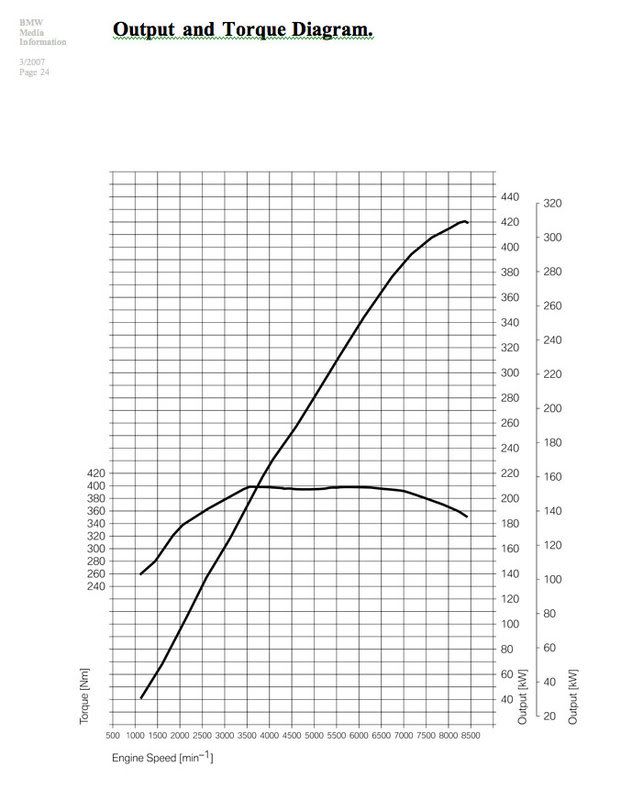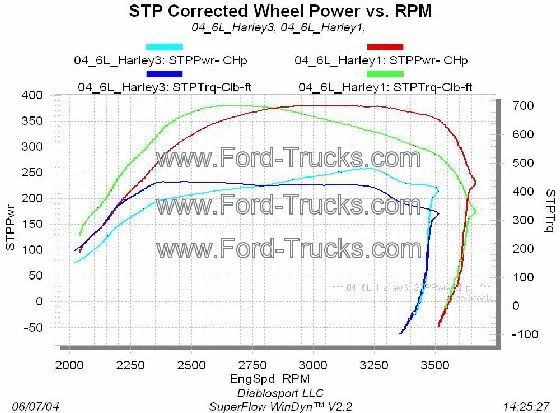Horsepower vs Torque
#1
#2
Torque is a twisting force, often expressed in ft-lbs. Horsepower is how fast the engine can make torque.
To calculate horsepower, multiply torque by RPM and divide by 5252.
HP = (torque x RPM) / 5252
If an engine makes a lot of torque but won't run really fast it won't have a lot of horsepower. If an engine makes a smaller torque, but revs really fast it will have more horsepower.
To calculate horsepower, multiply torque by RPM and divide by 5252.
HP = (torque x RPM) / 5252
If an engine makes a lot of torque but won't run really fast it won't have a lot of horsepower. If an engine makes a smaller torque, but revs really fast it will have more horsepower.
#3
#4
Yeah kinda, Mark summed it up fairly well. I don't like HP being called how fast an engine makes torque, its just a power measurement which is based on the torque and rpm you are operating at. I do a lot of work with electric motors which are often controlled to have a constant max torque throughout their speed range. Since HP is torque x speed, that means if the torque is a constant value throughout the speed range, multiply it by speed and the horsepower is a straight line from 0HP at 0rpm to peak HP at the highest RPM.
#5
More torque doesn't mean less horsepower really. It's about WHEN it makes torque and horsepower. Longer stroke engines, like most diesels, make a lot of torque at lower rpms. You can hit peak torque at 1200-1400 rpm and maintain it up to 2500 rpms. But it's not making much horsepower. Most gasoline engines don't start making decent torque until they reach 2000-2500 rpm and don't peak until maybe 3000 rpm. Also, the peak horsepower is made at peak rpms, but you have to wind it out to 5000 rpms to get there. Engines that create higher torque at lower rpms and can maintain the torque over a longer rpm range are better for towing...and maybe just as important, last longer if used for a lot of towing and hauling.
#6
Mark explained it really well. The relationship is entirely the numerical formula he provided you. Really the HP is the more important number of the two. Why this is important is gearing, an ideal gear that has no friction losses transmits 100% power through. What that means is that IF your driveline had no losses and your engine was making 100HP at the crank then there would be 100HP at the wheel. So if I need more torque then I just need more gear. Where the problem with going more and more gear is your RPMs become unreasonable.
#7
I think the best way to understand torque and hp and their different applications is by looking at a hp torque curve from a dyno.
Now on our diesel, specifically the 6.0 the peak torque falls off dramatically at just over 3300rpm. This gives us a ton of power down low where we need it for towing heavy objects. Where as a race gas engine has a flat torque curve across the entire rpm range. So as rpms increase, and torque remains flat the hp increases by the formula stated above.
Here is the curve from the new BMW E92 M3 w/ a V8. This is one hell of an amazing NA engine for sure. Look at how flat the torque is. It makes almost all of the torque through about 90% of the rpm range. That is amazing.

Now here is the curve for our 6.0 diesel

Now on our diesel, specifically the 6.0 the peak torque falls off dramatically at just over 3300rpm. This gives us a ton of power down low where we need it for towing heavy objects. Where as a race gas engine has a flat torque curve across the entire rpm range. So as rpms increase, and torque remains flat the hp increases by the formula stated above.
Here is the curve from the new BMW E92 M3 w/ a V8. This is one hell of an amazing NA engine for sure. Look at how flat the torque is. It makes almost all of the torque through about 90% of the rpm range. That is amazing.

Now here is the curve for our 6.0 diesel

Trending Topics
#8
#10
Do you have a better curve for the 6.0? I was looking and I thought that was decent. How do you like that curve on the S65B40 M3 V8 engine?! Not good enough to win international engine of the year though. The twin turbo in the 335I won that. But it did take best 3.0-4.0 L engine of the year.
#11
I like Mark's explanation best so far because it is short and simple. Irregardless... I can't miss out on my opportunity. 
Torque is the force that gets the load moving.
Power is the rate at which you can move that load from point A to point B.
The two factors are interelated by engine speed. Increase either speed or torque and you will make more power.

Torque is the force that gets the load moving.
Power is the rate at which you can move that load from point A to point B.
The two factors are interelated by engine speed. Increase either speed or torque and you will make more power.
#12
I like Mark's explanation best so far because it is short and simple. Irregardless... I can't miss out on my opportunity. 
Torque is the force that gets the load moving.
Power is the rate at which you can move that load from point A to point B.
The two factors are interelated by engine speed. Increase either speed or torque and you will make more power.

Torque is the force that gets the load moving.
Power is the rate at which you can move that load from point A to point B.
The two factors are interelated by engine speed. Increase either speed or torque and you will make more power.


Your torque and horsepower will always be exactly the same at 5252 rpm.
Sticking with the KISS method, Torque is a measurement of rotational force. Horsepower is a measurement of work performed.
A diesel engine makes a lot more torque than a gas engine because of extremely high compression ratios. More force on the pistons equates to more torque at the flywheel ------> wheels. But because a diesel typically operates at much lower RPM than a gas engine it's HP numbers will typically be lower. I can't tell you for sure why they operate at lower RPM but if I had to guess I'd say it has something to do with high compression and long strokes.
#13
#14
#15
Might not be. I just found them after searching the web. Here's a set I found from the FTE site, but I think it's for the 99.5 7.3...

And the HP curve...

Here's a link to the original thread...
https://www.ford-trucks.com/forums/6...ml#post5265024
And the HP curve...
Here's a link to the original thread...
https://www.ford-trucks.com/forums/6...ml#post5265024




